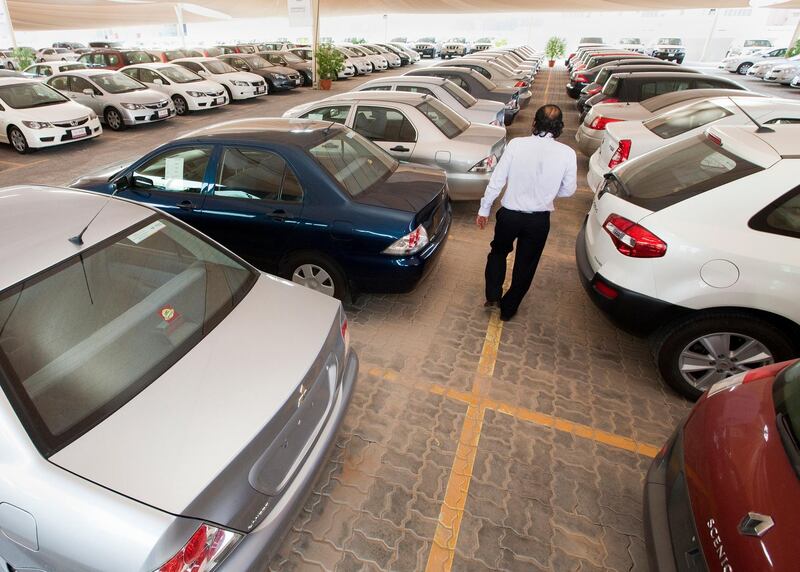The government has been asked to place a cap the rising cost of buying a car ahead of the introduction of VAT next month - when vehicles with be hit with a 5 per cent price hike.
Federal National Council member Saeed Al Remeithi raised the issue with the Minister of Economy on Tuesday, during a packed session that touched on the cost of living, insurance and medical treatment.
The youngest member of the chamber referred to an unspecified report that he said found the UAE has the steepest car prices in the Gulf.
He said a cap, like that set out to ensure rental prices could only rise by a certain amount and no more, would be fair for consumers.
“Today there is a lot of talk that the UAE has the highest prices in the Gulf, and with Value Added Tax... there is a fear of inflation," he said.
"This is a trend that will have many affects on society."
_____________
Read more on tax in the UAE:
[ Everything you need to know about VAT and a little bit more ]
[ UAE's tax authority urges businesses to register for VAT before Dec 4 ]
[ VAT in the UAE: a big change is on the way and it makes economic sense ]
_____________
Mr Al Remeithi also said that many young drivers overstretch themselves when they spend on a car.
But eventually the payments weight them down and they "find themselves unable to afford any other social commitments".
Minister of Economy Saeed al Mansouri said the government was not willing to interfere in the “free economy”, and had the environment to consider.
He also said a car remains a "luxury" and not a basic necessity.
“Putting a cap for a luxury good contradicts with this [free economy] principle, and it is not a basic good, like food.
“The UAE is also committed to certain environmental standards."
But he said he would consider price controls like that seen in the rental sector.
He said that prices have fluctuated for a range of factors.
“Since 2008, there have been changes to the law, with regards to car specifications, especially in Europe and Japan, where they took into consideration security and environmental features, and this led to higher prices," he said.
Currency fluctuations also affect prices, as do other issues.
“For instance, in Saudi Arabia they import a higher amount of cars than the UAE, and this quantity plays a big role with regards to pricing," he said.
He also also said car prices have reduced since August, adding that the UAE market is very competitive "and we expect even further drops in 2018".
Prices between this region and Europe vary significantly, with tax and other factors playing a part.
For example, a Toyota Land Cruiser Prado sold in the UK starts at about Dh180,000, compared to Dh125,000 in the UAE.
However, motoring industry figures said it was difficult to compare prices between countries in the Middle East.
Bill Carter, chief systems and innovation officer at Autodata Middle East, said “to do a price comparison between the various nations is virtually impossible because each nations vehicles will have a different specification level even though the vehicles are badged the same.”
“A vehicle may be badged “gxr” in every country – that doesn’t mean they are all equal.”
Each country orders its cars to be built to a certain specification level and that level will vary between each country. And if there is more than one dealer in a country, it can vary between dealers.
Nevertheless, the issue of where vehicles are most expensive is a hot topic that always comes up.
“I’ve been here ten years and if it hasn’t come up every year then every other year. But you are not necessarily comparing apples with apples.”
He said regulating the prices will only be useful “if there was an agreement between all the dealers and all the manufacturers that specifications would be the same. And that’s never going to happen.”
According to Mr Carter, environmental regulations don’t affect the prices much. The Emirates Authority for Standardisation and Metrology has decreed that all vehicles must meet the EU “euro 4” specifications for the 2018 model year – “that means the amount of emissions from 2018 will be more in line with what happens in Europe. The UAE are bringing out more of these environmental regulations compared with the rest of the GCC. But there are moves to standardise regulations across GCC.”
“But if you make sure you are comparing like for like, the price variation is not very big,” he concluded.







